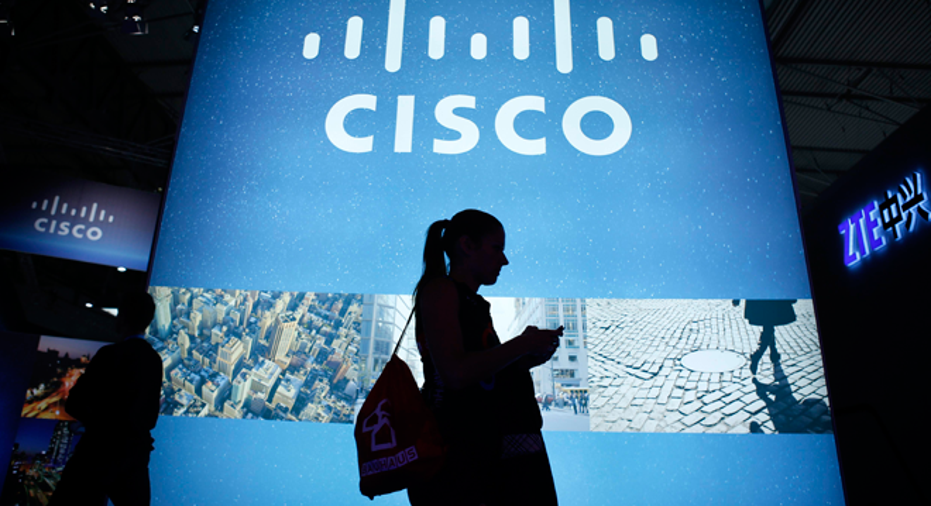Apple, Cisco Unveil Business Partnership

Apple Inc. and Cisco Systems Inc. are teaming up to help bring more iPhones and iPads to business users.
The partnership, announced Monday, is aimed at helping Apple's mobile devices communicate more effectively on corporate networks where Cisco gear is widely used, the companies said. They also plan to jointly work on technology to help workers with iPhones and iPads better exploit Cisco's collaboration products, including its video- and Web-conferencing services.
Apple Chief Executive Tim Cook and Cisco Chairman John Chambers said their companies had spent 10 months working out details of a collaboration, which they outlined to thousands of Cisco sales representatives Monday at a gathering in Las Vegas.
"It became clear to me that partnering with Cisco would yield the results that would enable us to transform work," Mr. Cook said in an interview.
The announcement comes as Apple, a powerhouse in devices sold to consumers, has been taking steps to build a broader presence in business.
Last year, Apple struck a partnership with International Business Machines Corp. to jointly create apps for the workplace, while IBM employees help sell and support Apple devices with corporate clients.
One impetus is a slowdown in tablet sales. IPad sales have fallen for six straight quarters; revenue from iPads declined 24% in the nine months ended June 27, compared with the same period a year earlier.
Cisco, meanwhile, has been trying to narrow its focus to more profitable businesses since Chuck Robbins assumed the CEO position from Mr. Chambers at the end of the July. Mr. Chambers, who leaned heavily on acquisitions in turning Cisco into the biggest supplier of networking equipment, said the Apple deal underscores a shift to alliances for the biggest industry players.
"We are going to talk about a new generation of partnerships," Mr. Chambers said.
The Apple-Cisco pact comes as businesses seek to use smartphones and tablets to make workers more productive. Apple's iPhones and iPads are popular inside businesses, largely through purchases by individual employees, rather than corporate technology buyers. Few companies manage to effectively integrate mobile devices with their networks of PCs and desk phones.
One big problem, Messrs. Cook and Chambers said, is ensuring employees get adequate networking performance in the workplace. Apple and Cisco said they aim to establish a "fast lane" for iOS devices in the corporate world, prioritizing wireless and Web connections so critical business applications aren't compromised by streaming cat videos and other nonbusiness fare.
Another issue, they said, is that many workers now have their phone address books on their iPhones rather than on their work desk phones, which may be supplied by Cisco. Integrating such directories is a goal of the partnership, Mr. Cook said.
Cisco, best known for routing and switching hardware, has branched into other products used by businesses. The company's $1.2 billion acquisition of Meraki Inc. in 2012, for example, made Cisco a bigger player in managing wireless networks at companies. Its WebEx service is widely used for managing online meetings.
Though they are partners now, Cisco and Apple were at one time legal adversaries. Cisco filed a trademark suit against Apple in 2007 over the name iPhone, the name for a product Cisco had acquired. The suit was quickly settled, in an agreement that allowed both companies to use the name.
Apple, now the world's most valuable company, struggled in the PC era to establish a presence in what is now a $2 trillion annual market for corporate technology spending. Many applications were written only for PCs running Microsoft Corp.'s Windows software, not Apple's Mac machines. Now, Apple is using the popularity of its phones and tablets to regain a foothold.
Among other recent moves, Apple has developed a sales program with technology companies that create apps targeted at businesses. Apple is playing matchmaker to help companies bundle apps together for small businesses--coupling, for example, a digital cash-register app with a workplace scheduling app.
Apple is expected to unveil the next wave of iPhones at an event in San Francisco on Sept. 9. The company has also been working on a larger tablet--a 12.9-inch iPad--that is expected to help draw in more corporate customers.
Write to Don Clark at don.clark@wsj.com and Daisuke Wakabayashi at Daisuke.Wakabayashi@wsj.com
Access Investor Kit for "Apple, Inc."
Visit http://www.companyspotlight.com/partner?cp_code=P479&isin=US0378331005
Subscribe to WSJ: http://online.wsj.com?mod=djnwires
Copyright © 2015 Dow Jones Newswires



















